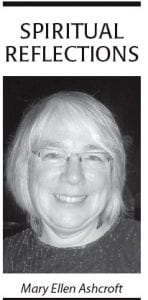Many people say they are “spiritual, not religious.” What do they mean?
Sometimes it’s a vote against religious institutions: one we can understand. The church is a flawed human institution— see clergy sexual abuse and the Crusades, for example. And while some would argue that the church has also done great good—(see the abolition of slavery and dismantling of apartheid), arguments are not convincing.
When people say they are “spiritual, not religious,” I hear them saying this: “I know there is more to life than bills and the mall, more to this world than meets the eye. When religion with its arguments, rules, and manipulations are stacked up next to meaningful mysteries, like nature and love, religion is not where it’s at.”
But religion’s rules and arguments have NEVER been where it’s at. Nobody has ever been convinced or converted by arguments (like the letters to the editor over the last couple months). Instead, arguments make most think, “I’m glad I’m spiritual, not religious.”
Spirituality, as I understand it, is this: God has placed in each person a longing, an emptiness that seeks meaning, what Augustine called a “Godshaped hole.” The reason so many are “spiritual, not religious,” is that at some level they know this can never be filled by anything as superficial as shopping or arguments or proof texts.
We don’t need arguments— we need Encounter. We were made for it. People may experience the Divine in a delivery room, the wilderness, the call of a moose, shimmering water, or in an ICU. Christ’s power in the gospels is in Encounter— his face-to-face interactions with people—as an alternative to religion’s rules and arguments. No wonder the authorities were mad at Jesus.
So, why do religious people argue so much, pointing to a verse here and a proof there? I believe it’s primarily because of a misunderstanding about how
we know what we know
(called epistemology).
Here’s the issue simply put: From earliest times people have believed what they believed for a number of reasons. For example, people told, wrote, and passed on creation stories because they believed these stories held truth about the world’s beauty, about God’s creativity and human longing for God, but also about human alienation, pain and hard work. When these were written, no one thought scientifically, so there was literally no way of questioning how these stories might relate to, say, dinosaurs. The stories spoke deep truths about themselves and God, and that’s how you knew what you
knew.
Centuries later, the move into modernism was a huge paradigm shift, as the rational and the objective became the preferred way of knowing. “I think, therefore I am,” said Descartes, and the mind, arguments, scientific proofs— became the dominant ways to know what we know.
This exaltation of the human mind and rationalism has affected Western civilization in many ways, including religion.
What happens to religious belief in an age of modernism/ rationalism? One response is “liberalism” which accepts rationalism and then figures out what it no longer believes. Many liberal denominations have fed the poor, fought disease, but at heart they hold this belief: “What is not rational or scientifically verifiable must be discarded, or smiled at as quaint tradition. We know better than to believe in miracles.” Liberalism has blindly accepted this “given”: the only way we know what we know
is through the human mind which is exalted above all. What the mind cannot encompass, cannot be.
Ironically, fundamentalism has a related problem. Accepting modernism’s standards for what counts as evidence, it demands that the Bible be read as scientific, objective truth. Since the Bible was never meant to be read this way, elaborate systems of imposing scientific understanding on the Bible are produced, without questioning the underlying “given”—that the Bible be read like a textbook and used to convince people.
Neither of these alternatives offers us what we need— Encounter. God’s choice to become flesh in the Incarnation underlines God’s knowledge that Encounter trumps rules and arguments. What if we admitted that our knowing is limited, that there might be other ways of seeking/expressing, knowing God? Maybe we could be both spiritual and religious!
Recognizing our minds’ limitations to encompass mystery, I believe religion offers a powerful gift. As part of our Encounter as spiritual beings, religions offers tradition, ritual, community, and sacrament.
We can say, “Okay I don’t know
T e
everything. My mind is limited.
<BO LD But as I root myself in this
tradition, my life is enriched by thousands who’ve gone before. As I join a community I will be supported and challenged. Ritual will help me shape life’s
big moments. In the space
<BOL D opened by sacrament I may
<B O encounter mystery. I don’t fully
Your wspaper understand. I never will. But
I’m going to be a part of this.” has agreed to pa
cipa in the 2 2
The real “given” turns out
isplay Ad Network to be the opposite of what we
thought: not rationality parading p ogram b running
its great ego, but the longing th se ads i the ma n
God has placed in each
ne s se tio of you
of us for Encounter with the
n w paper (not t
Divine. As we embrace that
if ct f “given,” we will find ourselves
your n wsp e ). At growing, both as spiritual and
times, dv religious beings.
Each month a member of the
ic section However
Cook County Ministerium
th deci io is ti
will offer Spiritual Reflections.
tyt h For August, our contributor
e sp p Ad is Mary Ellen Ashcroft, the
need to be decreased priest in charge of Spirit of the
slightly in size to t Wilderness Episcopal Church.



Loading Comments